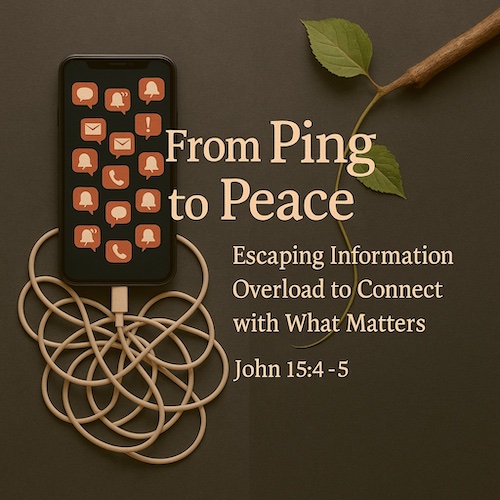
We live in an era where we have unprecedented connectivity but diminutive connection.
According to researcher Casey Phillips, every two days, we create as much information as the total amount of information that was produced from the beginning of time until 2003 (“Pullin the Plug,” Chattanooga Times Free Press, 01.05.14). We have never had more access to more information, and information has never had more access to us. The average smartphone user gets 63.5 notifications every day. And each notification alerts them to a piece of information that seems urgent (Elle Hunt, “One Ping After Another,” Guardian, 01.27.20).
All of this information overload has led to a syndrome called “IFS” (Information Fatigue Syndrome). There are a number of side effects associated with IFS, but let me highlight three that relate to increased connectivity and decreased connection.
- 1. A loss of internal reflection. The more external input we receive, the less investment we make for internal reflection. We are so consumed with “being in the know,” that we have lost a sense of knowing who we are and who we are becoming. As Kyle Idleman suggests, “All of our connection with what’s happening around us has left us very little margin to connect with what’s happening in us” (When Your Way Isn’t Working, 201).
- 2. A loss of prioritizing what is important. The free flow of information makes everything feel urgent and important. But if everything is important, then nothing is important. Our loss of prioritization of what is truly important leaves us feeling either overwhelmed and overstressed or apathetic and depressed.
- 3. A loss of relational connection. We can have hundreds of “friends” on Facebook, but little to no real friends in person. Studies are now showing that younger generations struggle with face-to-face interactions because their social development has been, by far, limited to screen time rather than in-person time.
Confusingly, our culture suggests that the remedy for information overload is more information. When we feel lonely, sad, depressed, or disconnected, we have been conditioned to Google our way out of those feelings. We may receive a quick hit of dopamine to satisfy the surface level of need, but we quickly plunge back into our lethargy, apathy, and loneliness.
Convincingly, Jesus provides a better way. We start by connecting to Jesus (John 15:4-5). As we remain in Him, and He remains in us, we are then able to connect with others in healthy ways. (1 Corinthians 12:14-27). And as we connect with Jesus and others, we connect to God’s Kingdom purpose in this world, that His Kingdom come and His will be done here on earth as it is in heaven (Matthew 6:10).
Do we need connectivity to information? Without question. But the way of Jesus and the way of our culture could not be more different in their chief aim of information gathering. We connect to information for the purpose of internal reflection and growth, prioritization of what is important, and relational connection. Information is not to distract us from what is truly important but to guide us into deeper connection with Jesus, others, and self…in that order.
If you find yourself struggling with IFS, make it your goal this week to connect more with Jesus than the news feed on your phone.
